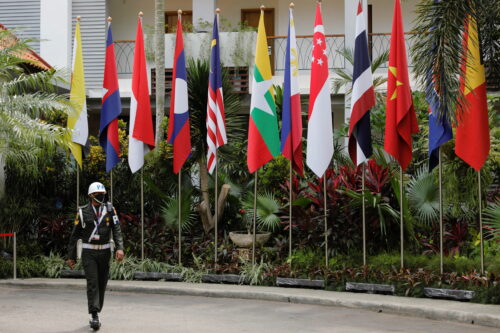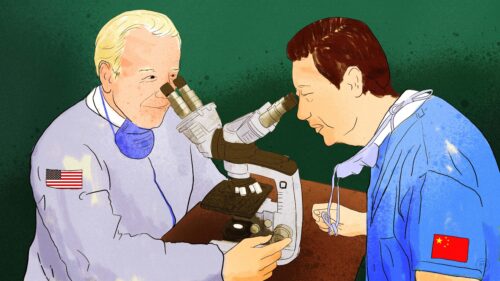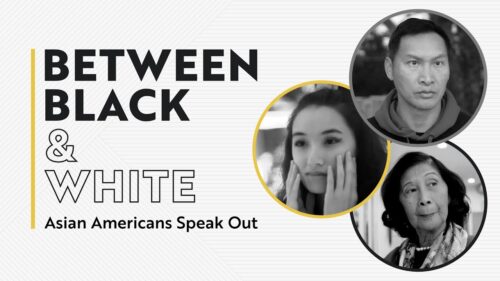Hands That Feed

At a time when ethno-authoritarianism is on the rise across the globe, often aided by new technology, the idea that the scientist may become an accomplice in the state’s crimes is not merely an intellectual exercise: It is a lesson from history that is poorly studied yet pressingly relevant.

“If Enrico Fermi were not married to a Jewish woman, could he have conceivably worked on the nuclear program for Nazi Germany?”
It was the fall of 2017. I was back at my alma mater, the University of Chicago, where I received my Ph.D. in physics two years prior, as the campus commemorated the 75th anniversary of the first controlled, self-sustained nuclear chain reaction. Several prominent members of the team that split the atom were refugees who had fled their birth countries in Europe amid rising antisemitism, including Fermi, the lead scientist on the experiment.
The physics department held a colloquium on Fermi’s life and career, featuring Gino Segrè and Bettina Hoerlin. The couple had co-authored a new biography of Fermi, The Pope of Physics. The title came from Fermi’s nickname in his native Italy, where the prodigal son of a railway worker and a school teacher was considered “infallible” in his scientific judgment.
During the question-and-answer session, I posed a hypothetical to the speakers. Fermi left Italy with his young family the same year he won the Nobel Prize in Physics, in 1938, after the Mussolini government enacted racial laws directed at Jews — such as his wife, Laura Capon. If he didn’t have her as a reason to leave, what might history have looked like?
“Well, that depends on many things being different,” Segrè said. “Fermi would also have to be German.” A physicist and nephew of the Nobel laureate Emilio Segrè, Fermi’s first student in Rome, Gino Segrè paused for a moment, and continued: “But yes, the answer is yes. Given how Fermi compartmentalized science from politics, my answer is yes.”
“I would like to be more hopeful,” Hoerlin gave a different response. Seemingly missing the premise of my question, she said, “I think Laura would have stopped him.”
Laura and Fermi had met at the University of Rome and married in 1928. The Nobel Prize ceremony in Stockholm, where Fermi received his medal, offered the couple and their children an escape path that eventually led to the U.S. Both of Laura’s parents died in the Holocaust.
In 1929, shortly after Fermi’s wedding to Laura, the young scientist was appointed a member of the Royal Academy of Italy by Mussolini, who came into power seven years prior, and joined the Fascist Party, as the membership brought an extra stipend for his research. When the speakers brought up this disturbing fact during their presentation, Segrè was quick to add:
“Of course, the Fascist Party in 1929 was not the same as the Fascist Party in 1938.”
Several in the audience nodded.

In the two years since that lecture, current events have repeatedly reminded me of that memorable exchange, including, most recently, the Jeffrey Epstein scandal. Two of the country’s most prestigious universities, Harvard and MIT, as well as several scientists at other institutions, had accepted donations from the financier and sex offender, including after his conviction in 2008. Different as the cases were, they are dots on a continuous spectrum that begs a greater reckoning: What are the civic and moral responsibilities of the scientist in relation to the source of funding, be it from an individual, an organization, or the state?
In the aftermath of the Epstein revelation, students, faculty, and the general public have been calling on universities to place more transparency and ethical considerations into their donor policies. As the important conversation takes place, it should not be limited to individual donors, much as that is needed, but also grapple with more complex issues, including corporations that engage in unsavory practices, as well as governments that employ oppressive policies, foreign and domestic.
MIT, one of the universities embroiled in the Epstein scandal, signed a five-year collaboration agreement in 2018 with iFlytek, the Chinese artificial intelligence firm that provides its government with voice recognition tools for public security, including operations in Xinjiang. Over the past few years, the Chinese government has turned the northwestern region into an open-air prison, with high-tech surveillance, mass collection of biometric data, and more than one million Muslim minorities in concentration camps. Technology from iFlyTek brings many benefits to society and civic life, but it is also a powerful weapon in the Chinese government’s ongoing ethnic cleansing and build-up of a nationwide police state. Meanwhile, government contracts and subsidies underwrite much of its business. In addition to MIT, the company has also funded research at other North American institutions, including Rutgers, Princeton, and York University in Canada.
In response to Reuters, MIT scientists acknowledged the concerns, but justified the partnership based on the quality of the work itself, that it would be peer-reviewed and open-access, that it did not have immediate applications, and that iFlytek had not interfered with the research. Notably, during the initial cover-up and hand-wringing from the Epstein fallout, similar arguments were made that the donations supported valuable science, hence the end justified the means.
One cannot profit from a crime without becoming complicit. Epstein’s benefactors gave the financier power and prestige, which helped him evade justice while continuing his predation. Moreover, when a research lab treats a pedophile and alleged sex trafficker like a VIP because he wrote a large check, offering him tours and soliciting his advice, such action promulgates the already-prevalent gender biases in academia. It is bad money and bad science.
In recent years, as the Chinese government tightens its authoritarian grip at home, it is also seeking to use its economic might in bending the rest of the world to its will. Academic partnerships with the Chinese government and related entities have contributed greatly to cultural exchange and the advancement of science, but the benefits do not negate the fact that such collaborations, by and large, also serve the Chinese government’s interests. Multiple leading scientists in the U.S. have found themselves in hot water when it was revealed that their work with Chinese state agencies, in genetics or AI, directly contributed to targeted surveillance and racial profiling in Xinjiang. At the minimum, the very existence of such joint ventures becomes part of the Chinese government’s propaganda, creating an aura of openness that overshadows its restrictive policies and human rights abuses. As more U.S. institutions turn to Chinese money without proper scrutiny, they also become vulnerable to political pressure from the Chinese government, as well as dynamics in U.S. policy toward China.

Earlier this year, multiple U.S. institutions, MIT included, suspended research partnerships with Huawei after the U.S. government deemed the Chinese tech giant a national security risk. The U.S. government has plenty of legitimate reasons to distrust Huawei, for both its aggressive business practices and the nature of the Chinese party-state, but the targeting of Huawei is also motivated by geopolitics, a tactic in the great power rivalry between the two countries.
A government, like any human institution, is always fallible. A parochial objective like “national security,” however necessary, is often used to give blanket justification to actions by the state, including its abusive policies. The Chinese government has claimed its crackdown in Xinjiang was to combat terrorism from Muslim extremists, taking a page from the U.S. government’s playbook in its response to 9-11.
For the scientist, relinquishing one’s social responsibility to the state, or limiting the moral imperative within national borders, is an ethical failing that can lead to grave consequences.
Earlier in Segrè and Hoerlin’s presentation, they showed a photo titled “The Greats at Lake Como, 1927.” It featured three young men, the 25-year-old Italian Enrico Fermi, the 26-year-old Swiss Wolfgang Pauli, and seated in between, the 24-year-old German Werner Heisenberg. Awarded the Nobel Prize in 1932 for “the creation of quantum mechanics,” Heisenberg was the principal scientist for the German nuclear program during World War II, where his work toward the Bomb was thwarted by limited resources and scientific mistakes.
The image haunted me. When I asked Segrè and Hoerlin the hypothetical question about Fermi, a small part of me was wishing for a definitive “no,” that Heisenberg was the exception in an otherwise conscientious community. Instead, I received an honest answer, to which I am grateful. What I sought was not revisionist history, but a confrontation with the inconvenient truth: when the state is the primary source of support for science, as it has been the case since World War II, the scientist becomes complicit in the state’s actions.
I have spoken and written extensively on the Chinese government’s abuse of technology, and how Chinese scientists, by working for the state, also contribute to their own oppression. However, the potential conflict between the ethics of science and the interests of the state is not limited to one country or one political system. At a time when ethno-authoritarianism is on the rise across the globe, often aided by new technology, the idea that the scientist may become an accomplice in the state’s crimes is not merely an intellectual exercise: it is a lesson from history that is poorly studied yet pressingly relevant.
I find myself raising the issue at collaboration meetings and in conversations with colleagues, using Fermi and Heisenberg as examples. “What would you have done in their shoes?” It is a difficult topic, the carnage of WWII so great that one instinctively averts the eyes, let alone try to picture oneself in a similar scenario. I sometimes wonder how arrogant I must have appeared in pursuing the matter, as if I was trying to prove my moral superiority, but what ethical higher ground could I claim when all I had were questions, not answers. By pressing others around me into the same moral quandary, I was hoping to feel less alone in my struggle.
It is hence disappointing how often I am told that individual objection is inconsequential to governmental policy, therefore not worthy of sacrificing one’s career over; that basic research, unlike applied science, is “safe”; that the more funding for science, the merrier, whatever the source; that working for the Third Reich was inexcusable, but “we are not there yet.”
When did “never again” become “not there yet”?
One senior colleague said that if the U.S. government were to turn full-on fascist, he would “resign and get the hell out!” I guess there is clarity in his willingness to sever ties with his home country, for which he deserves credit, but how comfortable one must be in his privilege to imagine a guaranteed exit?
Fascism does not happen overnight. I always find Fermi’s Fascist Party membership a more illuminating example than Heisenberg’s involvement in the Nazi nuclear weapons program. Fermi, by all accounts, was not a fascist, but before the racial laws directly threatened the lives of his family, he had decided that association with the Fascist Party was a worthy compromise to advance his science. He joined the Party in 1929: it was years before the genocide started, as Segrè emphasized, but also years after Mussolini came into power, when the dictator had already dismantled the free press, outlawed political opposition, and turned the country into a police state.
An oppressive state is not the invention of a single tyrant. The system of injustice is realized and sustained by the populace, who choose livelihood before conscience, who keep saying “it’s not too bad,” at least for themselves. Until it is, when it’s too late.

I think about Hoerlin’s response to my question, that she counted on Laura, Fermi’s wife, to be the moral compass. A gender should not be flattened to stereotypes, and moral pathfinding is not the sole responsibility of the feminine. But Hoerlin had good reason to believe that a Jewish woman would be more alert to the ills of fascism than her gentile, famously apolitical husband, however brilliant the latter was in his science.
At MIT, it was the women — and especially young women of color, some of them students — who were the first to speak up, and the most vocal in holding their institution accountable in its dealings with Epstein. Life as a member of the marginalized is a masterclass in understanding structures of power and their flaws, when the privileged are often oblivious or afraid of challenging the system from which they derive their power.
The evening after Segrè and Hoerlin’s lecture, the university hosted a film screening with the British artist Simon Starling, who created two multimedia installations that reflected on the birth of the atomic age and the impact of the Bomb. After the event, with the thought of Fermi still weighing on my mind, I asked Starling how the artist inserts himself in matters of the state, and if he had any messages for the many scientists in the community who prefer to separate their work from politics.
“Your question seems to imply that the artist is on a higher moral pedestal than the scientist,” Starling responded after a long, contemplative pause. “And I’m not sure I am comfortable with that notion.”
“There are a lot of negotiations,” he continued. “I show at the Tate, whose money was from slavery. And as an artist, I cannot control who buys my work or how it is used.”
I have been returning to this answer since it was uttered, impressed by Starling’s humility and candor. While Sir Henry Tate, who established the eponymous galleries, came of age after the abolition of slavery in Britain, the transatlantic sugar trade he made his fortune from relied on raw material from the colonies and slave labor, as the Tate acknowledges. Moreover, slavery and colonialism are not diseases eradicated centuries ago; they laid the socioeconomic and political foundations for much of modern society, including modern science and medicine, and their legacy in racism continues, however its manifestation has evolved.
If the house we live in is founded on lies and injustice, do we have the courage and conviction to tear it down, while giving up the security and comfort that come with it? Whether one may afford to do so is a convoluted negotiation with the self, but every so often, the mind is so imprisoned in the world as one has always known it that it is unable to see, and does not dare imagine, an alternative; complacency becomes complicity.
Science prides itself on disruption and discoveries. To challenge the old system and establish new ones is the only path to real progress, in science as it is in society. Training the critical eye on only nature itself, but not the social institutions that enable the exploration of nature, is not only irresponsible science, but also a failure of the moral imagination.

Yangyang Cheng and the Science and China Column will return on the final Wednesday of every month. Last month:





